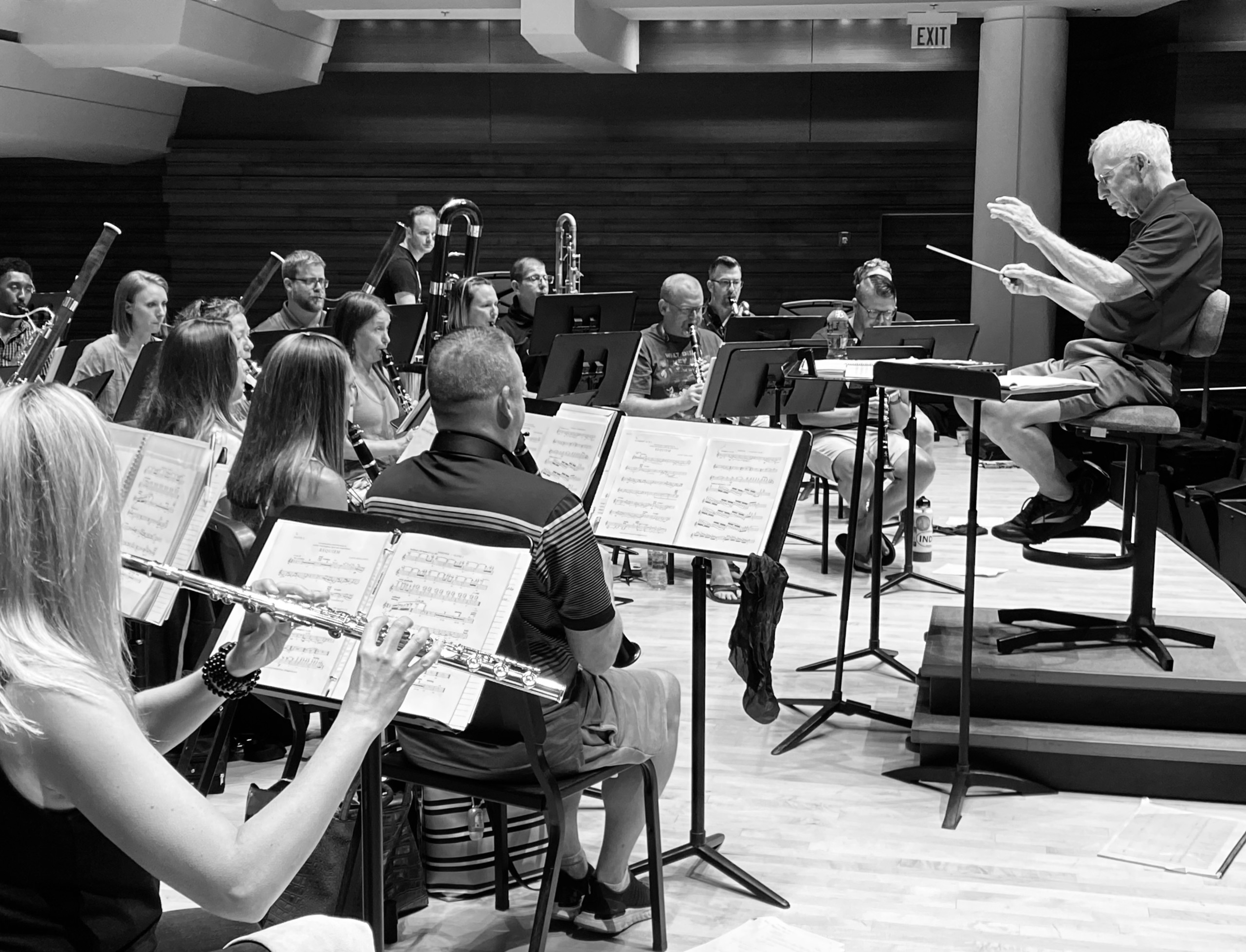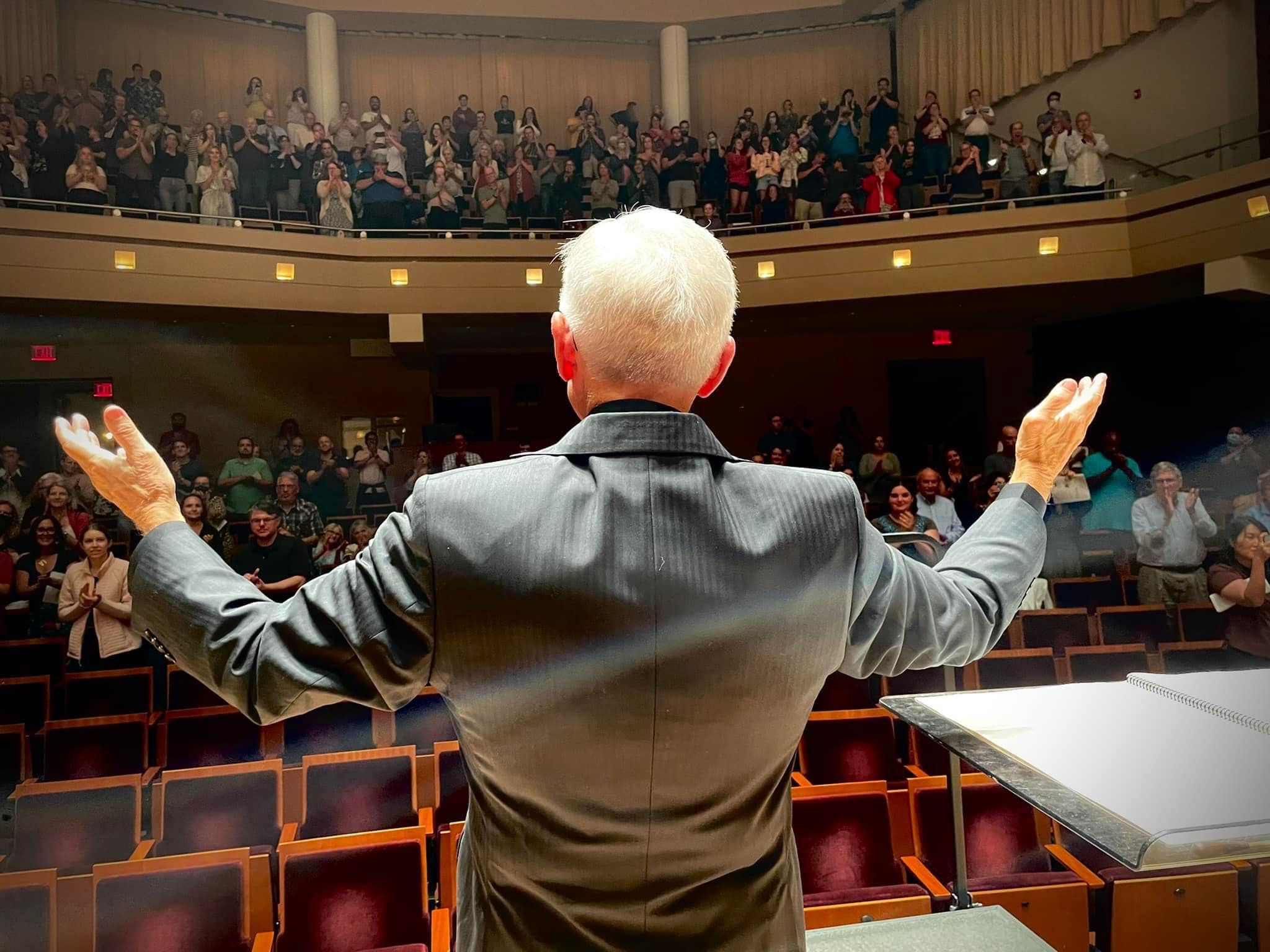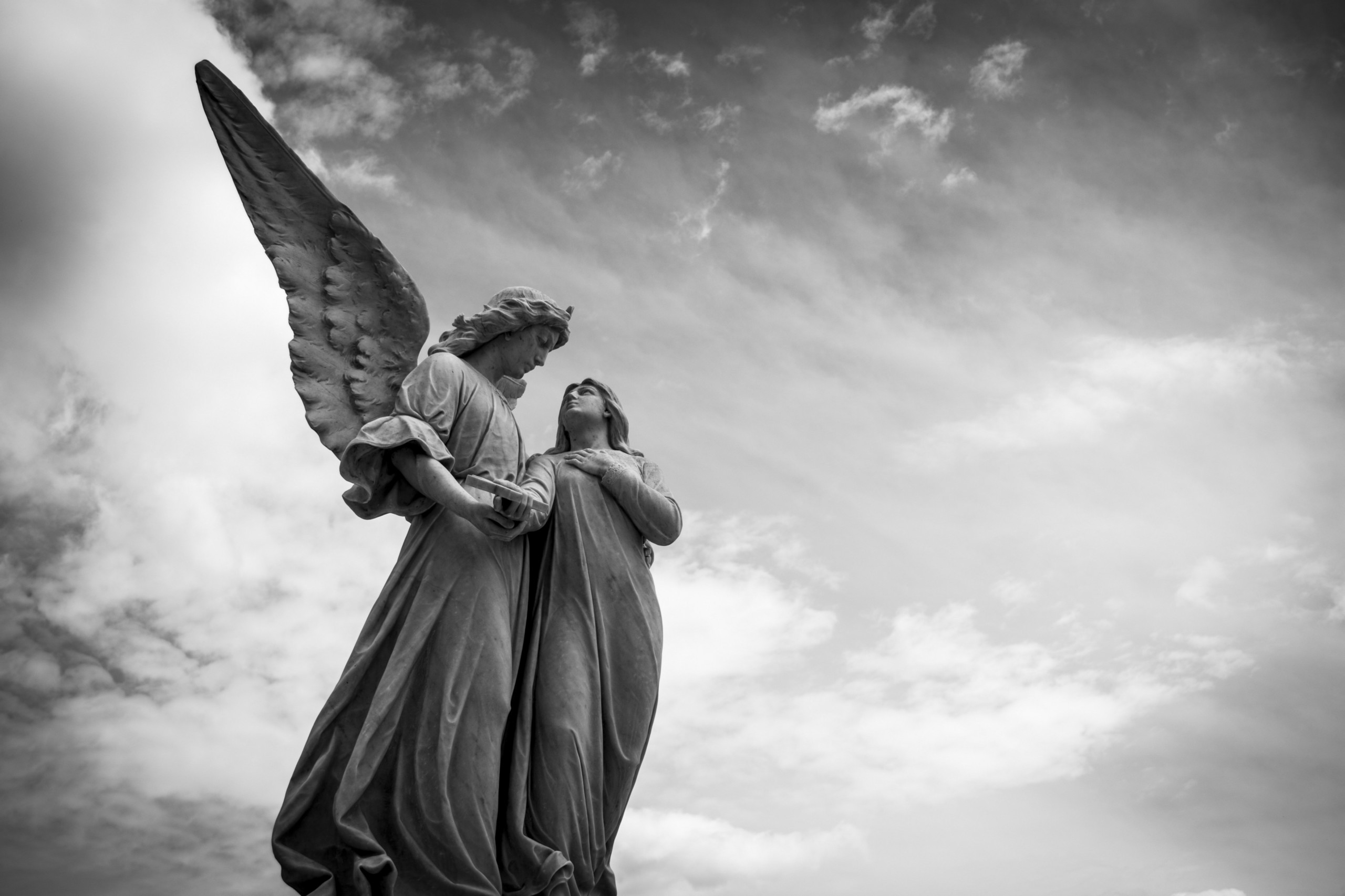David Maslanka was honored with an honorary doctorate by St. Olaf College. Here’s the entire ceremony:
The following is the full text of Dr. Timothy Mahr’s and David Maslanka’s remarks.
Dr. Timothy Mahr’s remarks
On the nomination of the faculty, and with the approval of the St. Olaf Board of Regents, it is my pleasure to present Dr. David Maslanka as a candidate for the degree of Doctor of Fine Arts, honoris causa.
Our world needs artists. We live in extremely contentious times full of conundrums that seemingly defy solution. The fine arts have long been a vital means of discovering the essence of being human and penetrating the obfuscations that bar deeper understanding. We struggle to know the outer and the inner worlds. The best artists provide revelations to us all, if only we allow them this opportunity by fully engaging their work. Our honored guest, Dr. David Maslanka, is indeed one of these artists. With his music, he explores a full range of emotional expression, as we heard in the excerpt we just performed. His music invites listeners to look deeply within while also lifting our hearts to the concerns of others: sublime and simple serenity is balanced by rushing riots of rage or exuberant exultations. He encapsulates the human condition within artistic statements that challenge but ultimately uplift.
Esteemed colleagues across the spectrum of music-making affirm Dr. Maslanka’s standing in today’s musical world. A prolific composer, his compositional voice resonates strongly with audiences. Dr. Maslanka is one of the major symphonists of our time. His challenging works have received performances by ensembles and musicians around the world.
Dr. Maslanka’s prominence as a composer of core repertoire for winds and percussion is established by the depth and breadth of his over 50 works for the medium. One could say he singlehandedly caused a paradigm shift in what a band or wind ensemble sensed it could express. To be sure, he has created music for various chamber ensembles, choirs, and orchestras that enjoy repeated performance, but I dare say it is his body of work within the band realm that glows the brightest. It has had a seminal and lasting impact on its field. This oeuvre does not have at its center the usual short works for high school band; rather, his rich output includes seven symphonies, 15 concertos and a Mass. To illustrate this magnitude, the St. Olaf Band presented one of the premiere performances of his Symphony No. 9 a few years ago – that single work was the entire 75-minute program that day. His works are contracted to major publishers and many are featured on over 90 commercially released compact disc recordings on labels in Sweden, the United States and Japan. Twenty-five doctoral dissertations have focused on some aspect of Dr. Maslanka’s music.
The St. Olaf Band has been involved with consortium commissions of six of Maslanka’s works since the fall of 2001, when the band performed his Symphony No. 5 while on tour. At that time, Dr. Maslanka was in residence on our campus for two days as we prepared this challenging work. The musical and technical requirements of his score, enlivened by his gentle, yet incredibly intense manner during rehearsal, raised an already accomplished ensemble to a greater height. The level of professional demand he brought to bear on the St. Olaf Band during those rehearsals altered the perception of what this ensemble could accomplish and we haven’t looked back since. David subsequently travelled with the band for the Montana portion of our tour that year, during which he attended three performances and shared meals, tour skits and devotions with the band members.
This was the beginning of a long and close relationship with David Maslanka; the St. Olaf Band went on to present consortium premieres of his 7th, 8th and 9th symphonies, and his clarinet and percussion concertos. We have produced three compact disc recordings on the St. Olaf Records label that feature his works, including a two-CD set entitled Inner Visions: The Music of David Maslanka. Our relationship has been meaningful for well over a decade, and it culminates this year with the commissioning of a work in observance of the St. Olaf Band’s 125th anniversary, as well as his residency leading up to this ceremony today. His new work for us, Angel of Mercy, which he describes as a prayer for peace in our troubled times, has been featured on our tour concerts these past few weeks, and was well-received by the audiences, especially at our performance at Carnegie Hall this past Saturday evening and at the Minnesota Music Educators Association conference at which we performed just last night, where it received very long, enthusiastic stand ovations. We performed the opening section of this work just moments ago and I cordially invite you to our Home Concert this Saturday afternoon at 3:30 pm in the Skoglund Center Auditorium so that you may experience the work in its entirety. Funding from the Miles Johnson Endowment supported the St. Olaf Band’s participation in these consortia, as well as the commission of our Angel of Mercy.
David Maslanka was born in New Bedford, Massachusetts, and attended the Oberlin College Conservatory where he studied composition with Joseph Wood. He spent a year at the Mozarteum in Salzburg, Austria, and earned master’s and doctoral degrees in composition at Michigan State University where his principal teacher was H. Owen Reed. He has been a faculty member at the State University of New York at Geneseo, New York University, Kingsborough Community College of the City University of New York, and Sarah Lawrence College. He has been a freelance composer since 1990 and currently lives in Missoula, Montana.
The St. Olaf Band and its audiences have been fortunate to establish and nurture a warm and fruitful relationship with one of the great composers of our time. This quiet, generous artist confronts us with his unflagging challenges, and these encounters with his music often enable personal revelation and communal understanding.
President Anderson, I present Dr. David Maslanka, a true and humble servant of the art of music, for the degree of Doctor of Fine Arts, honors causa.
David Maslanka’s Remarks
[starts at 20:50]
President Anderson, honored faculty, staff, and regents of St. Olaf College, students, and friends with us here today: it is my great honor to be invited to join the St. Olaf family, and my pleasure to have the opportunity to say a few words about the creative life and its place in the world.
Angel of Mercy – This is the title of the music that I composed for the St. Olaf band. These words, “angel of mercy,” simply rose in my mind as I was writing this music. The word “mercy” derives from “misericordis,” which, according to Pope Francis, means “opening one’s heart to wretchedness.”
I have a very strong connection to Martin Luther King, Jr. He was the speaker at my commencement in 1965 at Oberlin College. I lived through that troubled time of the ‘60’s, and through all the years since, with Martin Luther King as a powerful guide. I will quote him twice in my remarks. The first is this from over fifty years ago:
Evil is rampant in the universe. Only the superficial optimist who refuses to face the realities of life fails to see this patent fact. This particular sort of optimism has been discredited by the brutal logic of events. Instead of assured progress in wisdom and decency, man faces the ever-present possibility of a swift relapse, not merely to animalism, but to such calculated cruelty as no other animal can practice.
I want to come back to this large statement of the human condition through some specific thoughts on the personal creative life.
I have been writing music for over half a century. The composer life is interior and seemingly self-involved. What bearing does the focused inner life of one person have on the greater world?
The year 1968 was a dangerous time for the United States. We had the Cold War, the Vietnam War, boiling anti-war protests, powerful challenges to established authority, Nixon, Chicago Democratic Convention with riot police and teargas, and the assassinations of Martin Luther King and Robert F. Kennedy. The historian, David McCullough, calls it the closest we have come in modern times to breaking apart.
In 1968 I was a graduate student in music composition at Michigan State University. My teacher that spring was Paul Harder, a laconic man of few words. I came to a lesson one time, very upset with what was happening in the country, and asked the question, “What was the point of doing music with the world in such a mess?” He gave me a one-sentence answer: “If that’s how you feel, go and do something else.” I was jolted into an understanding of who I truly was, and I knew above all else that I was a composer. I still see that moment as a critical turning point in my life, and it began the long, uncertain, and alone journey of the creative life.
A key point in that journey was the discovery of the nature of the unconscious mind. After some years of unfolding my personal issues in psychotherapy, and my beginning exploration of the unconscious, I had an epiphany. This took place in a pizza shop in Brooklyn, NY in the mid-1980’s. I had finished a day of teaching and was having a snack before getting on the train to Manhattan. I realized that there were two minds at work in me: my personal psychological mind, and a non-personal unconscious mind which included the entire human legacy, and was one with the universal mind. My ongoing responsibility as I saw it then was to clear the conscious mind as completely as possible, so that the deeper mind could come forward in me in its full power. This work continues to the present day.
Here is a brief layout of the nature of mind:
Personal mind includes the conscious mind, the subconscious, deeper personal memories that are progressively harder to retrieve the further back you go, and the deep personal unconscious which I will simply characterize as dream space.
Then the collective unconscious, the archetypal level, which is the inherited structure of mind of the human race: its foundations go all the way back to first life on earth, and include earth itself. This rests on the ultimate foundation, universal mind, which includes all of the past, all of the present, and all of the future. All of this is in each of us. We are this, and whether we are conscious of it or not, it is us; it sustains us; it is the source of all creative ideas; it is why we are alive as humans.
For the past fifty-plus years my work has been to move my conscious mind into the realm of the unconscious and the universal, and to become, as best I can, a channel for the living energy that wants to come into our time and space through musical sound.
I will make an assertion which has no proof, but which has been borne out for me over time. And that assertion is that every mind is immediately open and present with every other mind, alive at this time, or in the past. I will tell you a story of St. Olaf and my visit with him. You can take this at face value, or as imaginative fantasy, or as composer brain gone off the tracks a little bit. But let me remind you that people still pray to Mary, the Mother of God, and Jesus Christ, as living entities, with the expectation of being heard, and of receiving a response.
With long practice I know where to go in my mind to meet the life force of other people. I usually ask to see them or invite them in. St. Olaf arrived by sea, on a “boat of the dead.” He suddenly and magically appeared in my mind space. He is a powerful man with a powerful gift of heart. He is in full kingly regalia: warrior dress, ermine cape, a crown; his throne is gold; there are animals and attendants; he radiates power. I ask him: “What do I need to know for the sake of the music that I am to write for St. Olaf College?” He takes a crystal on a chain from around his neck and puts it on me. It sinks into my chest and disappears. This is the heart of Norway, and by extension the heart of St. Olaf College. It is the heart of mercy, the heart open to the wretchedness of the world. St. Olaf disappears as suddenly as he appeared, is instantaneously back on his boat, and moving out to sea. The crystal is a gift of the immediate presence of the heart. Through it comes healing energy. This is hope in the face of despair. Carl Jung said, “In chaos are the seeds of the new.” This is how those seeds arrive and begin to grow, effecting the healing of our personal wounds, and the wounds of the world.
I want to return to the “evil is rampant” quote from Martin Luther King. It is a dark statement which might lead one to despair, especially as one gets older, and decline becomes a reality. But, the same man who soberly warned us of the pervasiveness of evil, now shows us the heart of mercy. This individual man who was called by God, opened himself fully to universal mind. Two months before his assassination in April of 1968, in a Sunday sermon, he spoke out the summary of his life, and what he knew to be important. It is the antithesis of despair, and the call to each of us to make a useful life.
He said:
Once in awhile I think about my own death and my own funeral, not in a morbid way, but I ask, “what would I want someone to say?” If any of you are here when it is my time to meet my end, don’t make it a long funeral. And if someone gives the eulogy, ask them not to make it too long. Ask them not to mention the Nobel Peace Prize – that’s not important. Ask them not to mention all the other awards, or where I went to school. Those things are not important. On that day I would like someone to mention that Martin Luther King, Jr. tried to give his life in the service of others. On that day I’d like someone to say I tried to love somebody, say that I tried to feed the hungry, and clothe the naked. I want someone to say Martin Luther King, Jr. was a drum major, a drum major for justice, a drum major for peace; say that I tried to be a drum major for righteousness. And all those other shallow things won’t matter. I won’t have anything to leave behind- no money, none of the fine things of life. But all I want to leave behind is a committed life. And that’s all I want someone to say.




